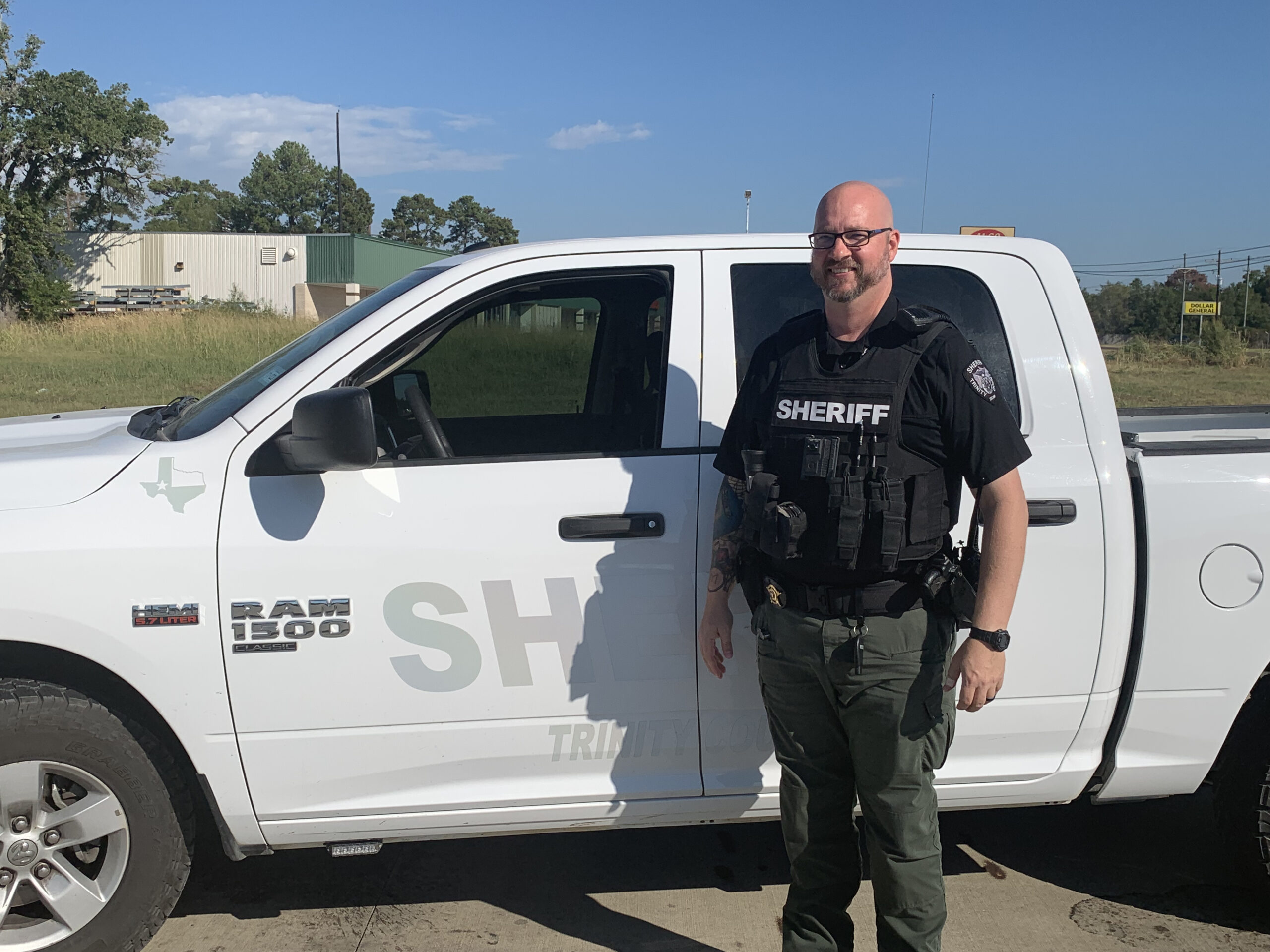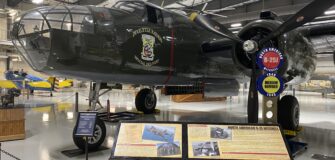
As a fresh college graduate, Scott Moore began his career with a stint as a Huntsville police officer. When he left for seemingly bigger and better things, he probably thought, “I shall not pass this way again.” I’m quite certain he didn’t foresee returning in 2022 wearing two very unlikely concurrent titles: Reverend Scott Moore, pastor of Wesley Memorial United Methodist Church in Huntsville; and Deputy Scoot Moore, peace officer with the Trinity County Sheriff’s Office. Let’s learn more about the journey that led back to the starting place and those two improbable simultaneous roles.
While young, I toyed with the idea of being a professional musician or a band director. I still love music, but decided not to make a career out of it. My parents taught me at a young age to help others and put others ahead of myself, and I saw law enforcement as a great way to do that.
I grew up in the Montgomery County area and went to high school in The Woodlands. I studied criminal justice at Sam Houston State University, before becoming a police officer for Huntsville from 1995-1997. I continued in law enforcement, with time at Montgomery County Sheriff’s Office, Montgomery County Precinct One Constable, U.S. Customs Service, and Beaumont Police Department.
I got seduced by that whole mantra that the federal level is the “be-all-end-all” for law enforcement. For me, that wasn’t the case. I realized I could do a lot more good working the streets and investigating crime in my local community.
Not at all. I was actually called to the ministry at age 17 and ran from that call for 14 years. I didn’t think I was “worthy” to be a pastor. Once I got into law enforcement, I realized that was part of my ministry. I have numerous opportunities to minister to people, both directly and indirectly. At 31, I had a very deep conversation with God and realized it was time to go into the ministry fulltime.
I know now those years in law enforcement were preparing me for ministry. I grew up as an only child in a very stable household in a middle-class family. I knew nothing about the hardships of a broken world. Law enforcement showed me not only that the world was broken, but that sometimes, bad things happen to good people through no fault of their own. Those experiences equipped me for fulltime ministry.
This was in 2006. I went to seminary while pastoring a church in Palestine and tried to leave law enforcement completely behind. I ended up serving as a police reserve officer in Palestine, so not exactly a clean break. Honestly, even during the next years when there wasn’t a direct connection, I found myself keeping up with changes in the laws and maintaining friendships in law enforcement.
I moved to Conroe in 2009. For a period of time, I was in charge of disaster response for about 600 congregations of the Methodist church in a 58-county region in East Texas, and that was my full-time ministry. I worked for the Texas Annual Conference of the United Methodist Church as missions director and disaster response director. My law enforcement experience definitely helped in being effective in that position. You’re finding people at low points in their lives and trying to provide assistance and resources so they can get back to a stable life.
I was in charge of disaster relief for the 2015 Houston floods, the 2016 East Texas floods, for Hurricane Harvey, and for Tropical Storm Imelda. We had three 500-year events over a three-year period. That was very taxing on me personally. I left that position and went into what the Methodist Church calls “extension ministry.” Using my construction background from disaster ministry and side jobs over the years, I worked for over two years for an architecture company, traveling Texas and helping churches build new buildings. I did construction management and security consulting.
Exactly. It was a season of Sabbath for sure.
We all go through seasons of change in our lives. Divorce was another season of change I had to go through. I have three adult children, two in college, and one married and out on his own. As difficult as it was as a family unit to go through that, I have come out on the other side with a much better understanding of some of the family dynamics that I deal with as a pastor and a peace officer. It’s made me much more empathetic.
After my divorce, I was looking for a place to worship. I needed a safe place to land and to worship without feeling judged or alienated, a place to be loved, included, to heal emotionally and spiritually, and to be safe. I knew Rev. Kimberly Carney, the pastor there, as a friend and through past dealings through disaster relief. Then, it came time for her to move (in the Methodist church, they move ministers every few years). Due to a season of post-Covid church challenges, the congregation was not in a financial position to replace her with a full-time pastor with benefits and housing allowance.
God brought us together in perfect timing and circumstances for me to take on a position as a part-time pastor while working a new job in full-time law enforcement. The people in the church stepped up and took on more active roles with duties which had previously been “clergy-centric.” It has been a positive experience, with growth on both sides.
When we moved to Conroe in 2009, I began volunteering in my children’s schools. One volunteer position led to another. I ended up a PTO president and on several committees for the district. I served seven years as the chaplain for the Conroe High School football team. In 2016, I ran for a position on the Conroe school board. Last night was my final board meeting. My seat expires in November. During my tenure, I was elected as a director for the Texas Association of School Boards and also asked to be on the board of the Mexican-American School Board Association. Conroe ISD is very diverse, with over 50% Hispanic student population, but our school board had no Hispanic representation. I reached out to that organization to help me better understand and represent the students and families.
I have been married to Audrey Young for four months! In her, I have found a mate in life who is my true partner and equal. We support each other in every way. She is the director of student support services for Nacogdoches ISD, in charge of all special education and auxiliary services related to special education. She is also the elected state board of education representative for Brazos, Grimes, parts of Harris, Houston, Montgomery, Polk, San Jacinto, Trinity, and Walker counties.
I think there is a misperception, particularly in law enforcement and schools, of late—not always, but certainly, the last few years—that people serving in those positions are doing so for their own selfish reasons. People think police officers are just there to exercise power over other people, and politicians are just using positions as “stepping stones” to the next level. That has not been my experience over the last 30 years. I believe people in those positions are there, far and away, to serve other people, to serve their communities, and to try to make life better.
Music, kayaking and boating, and schoolwork. I have completed all coursework on my PhD and am finishing up my dissertation now. The degree is in leadership studies, and my dissertation is on school board leadership, specifically.
Very eclectic. The music that I play now is pretty much limited to contemporary Christian, gospel, some country, some 70s guitar rock kinda stuff. But the music I listen to is all over the place. Audrey and I love musical theatre, and when we are in the car, we are usually listening to a soundtrack from some musical.
I play guitar, bass, drum, tenor trombone, bass trombone, baritone, tuba, and a little bit of piano.
As a good person. Somebody who did the right thing. We all make mistakes, but someone known for doing the right thing to the best of my ability at the time.

Postcards Magazine
936-293-1188
PO Box 690
Huntsville, TX 77342
